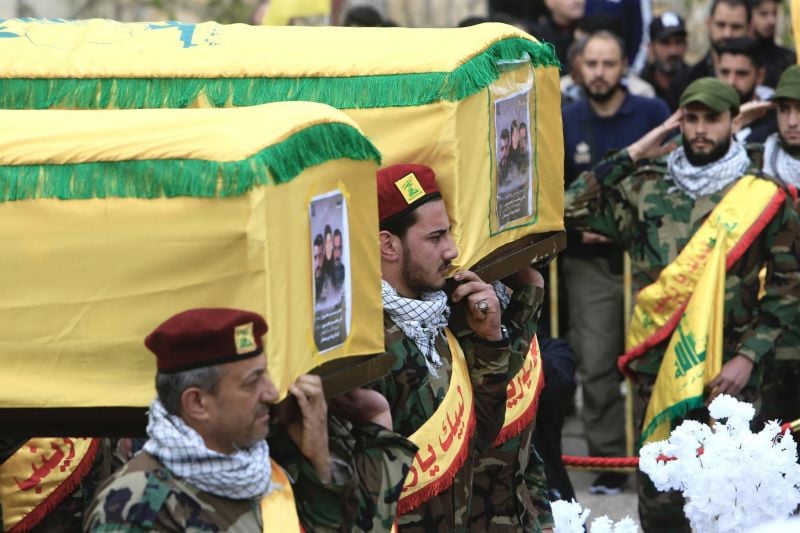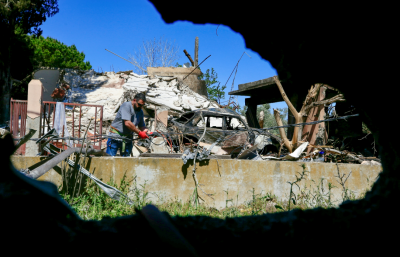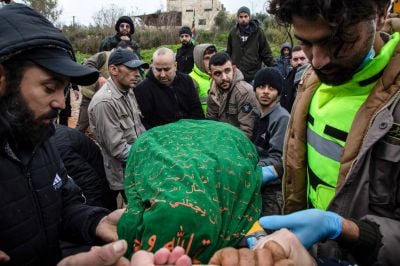
Hezbollah militants and supporters attend the funeral on March 6, 2024 of one of the group's members Hassan Hussein, his wife Ruwaida Mustafa, and their 25-year-old son Ali Hussein, killed a day earlier in Israeli bombardment. (Credit: AFP)
BEIRUT — Since fighting broke out between Hezbollah and Israel on Oct. 8, 282 Hezbollah fighters have allegedly been killed.
However, on several occasions, local residents, mayors, friends and family members have claimed to L’Orient Today that those killed in the Israeli strikes are actually civilians — and that Hezbollah is simply claiming them as “martyrs.”
In one such case, Khalil Fares, a vegetable store owner in Jadra, was killed in an Israeli strike on the coastal town on Feb. 10.
To locals, he was “the local vegetable store owner who had a small makeshift shop on the side of the road for years,” Dana Reslan, a resident of Jadra, told L’Orient Today.
“Several residents of the town were shocked when Hezbollah claimed him as one of its fighters who was killed on the way to Jerusalem” — that is, killed in battle, Reslan said.
Charbel Azzi, in his 50s, was buying vegetables from Fares a few minutes before Fares was killed. He told L’Orient Today in February that Fares’ reaction to the Israeli strike seemed to show he wasn’t familiar with war scenarios.
“I told Khalil I wanted to pay him, but he replied, 'I'll be back in a minute,' before rushing towards the scene of the strike… I was 20 meters behind him when the second missile fell on him," according to Azzi.
“The fact that he ran like that before the second strike shows how little he knew about war zones,” Azzi said.
‘No benefit’ from inflating death count
Kassem Kassir, an analyst reputed to be close to Hezbollah, told L’Orient Today, however, that he does not believe that “Hezbollah is trying to increase their number of killed fighters. It does not benefit them and they have no reason to do so.”
Kassir explained that much of Hezbollah's work depends on secrecy and so “a person could be a member of Hezbollah for years without the general public knowing that they are members of the party.”
A middle-aged Hezbollah fighter, who spoke on condition of anonymity because he is not authorized to speak to the press, told L’Orient Today that “there are several types of members in the party. Some are affiliated officially with the party while some are supporters or who have many family members who are affiliated with the party, and so when they are killed, out of respect, the party claims them as their own.”
But why might Hezbollah claim that such people died “on the way to Jerusalem?”
“Simply because we believe that the sacrifices of Hezbollah's official members and the victims of the Israeli strikes are part of a larger battle with the Israeli enemy to, God willing, liberate Jerusalem from the Zionists,” Kassir said. “ The killed victims died while the effort of liberation is ongoing.”
Similar incidents have happened with the Amal movement.
In mid-February, Hussein Ahmad Berjawi’s family invited their relatives for a Wednesday night dinner in Nabatieh. Later that evening, they were being pulled from the rubble, after a missile ripped through their apartment.
L’Orient Today spoke to residents afterward who were shocked that the Berjawi family’s home was attacked and insisted that the family does not have any political affiliations.
Two days later, Hussein was claimed as “a member of the Amal Movement who was killed while performing his jihadist duty defending Lebanon and the south.”
Hezbollah and Amal Movement are “different in this aspect. Hezbollah mourns its killed members as fighters killed on the path to Jerusalem, marking it as a more regional conflict, whereas the Amal Movement insists that they died defending Lebanon. This difference is significant," the Hezbollah fighter explained to L'Orient Today.
Imad Salamey, professor of international relations at the Lebanese American University (LAU), told L’Orient Today that "rationally speaking, Hezbollah would be keen on concealing the number of its killed fighters to show that Israel is failing in its attack against Hezbollah and that Israel's attacks are not reaching the targets."
However, "the party also wants to show to the Palestinians that it's sacrificing for the cause of Jerusalem and standing with the Palestinians in Gaza."
"The party is loyal to its people and is very transparent with them, that is one of the primary strategies of Sayyed Hassan Nasrallah [Hezbollah's chief] which also mobilizes support for him among his people," the Hezbollah fighter explained.
However, some people have claimed that families of the victims are eager to count their loved ones as slain Hezbollah or the Amal Movement fighters, seeking the requisite cash assistance from the parties.
A Hezbollah spokeswoman explained to L’Orient Today that the party does not aim to conceal or exaggerate the number of its killed fighters. Within Hezbollah’s structure, she added, there are several types of “members involved with the party.”
“There are the members who are official members and have official files where they are registered as party members who receive salaries… and then there are the people who we refer to as the taabea, who are close to the party and are vivid supporters but receive no cash assistance from the party,” she said.
“When taabea members are killed by Israeli strikes, Hezbollah mourns them, but the slain members did not have salaries, and neither will their families,” she added.

